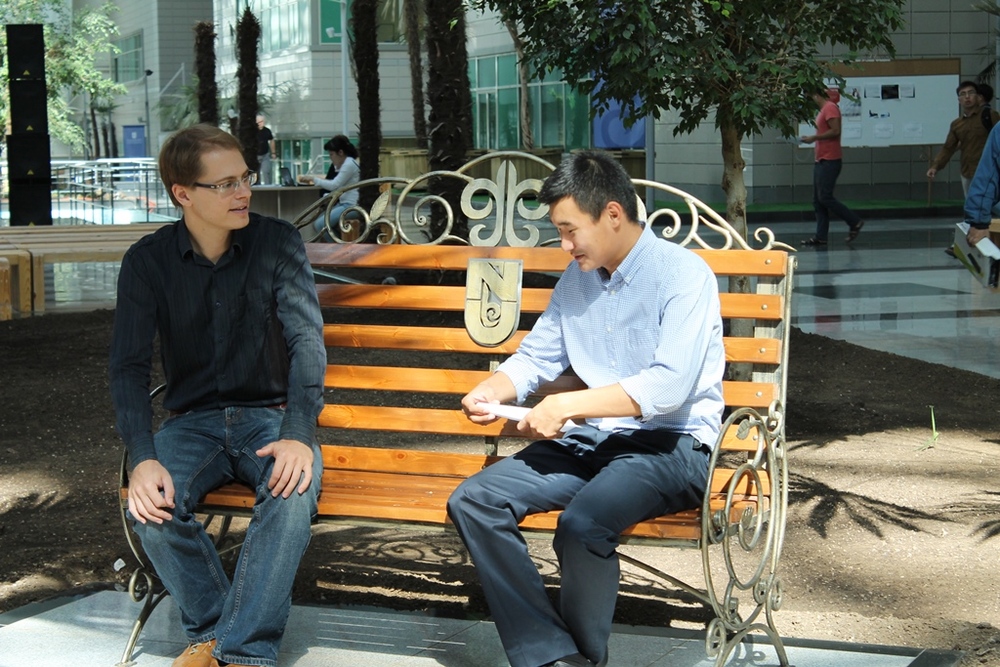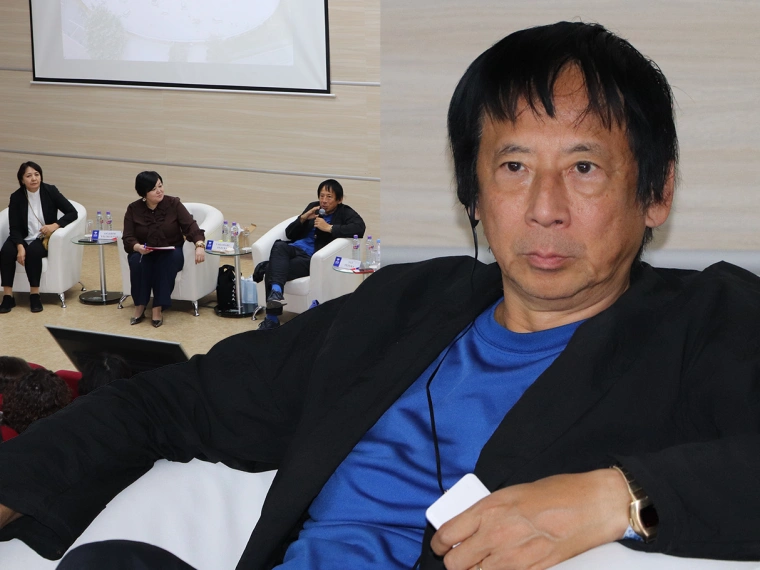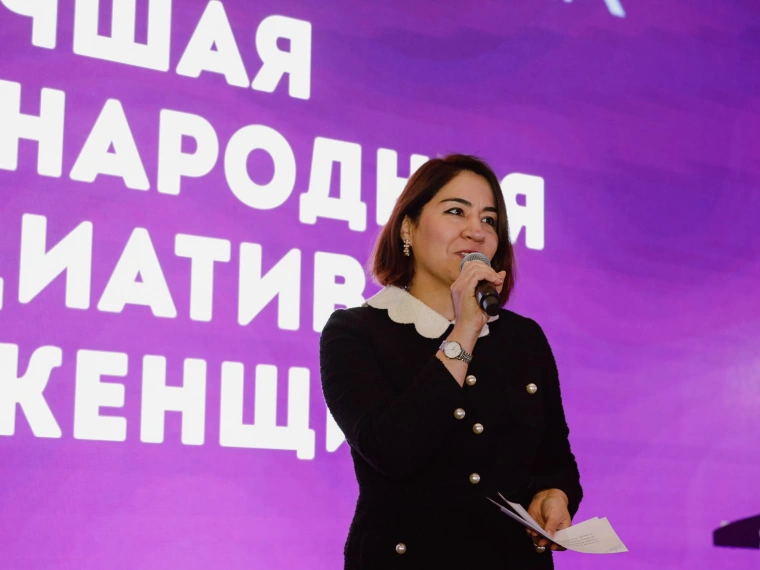
Dr Gabriel McGuire: «I would absolutely explain to my friends the tradition of eating sheep's heads before they come to Kazakhstan»
Gabriel was born in Alaska. He went to college there, majored in anthropology and later in folklore. Then he gradually became interested in Central Asia and finally ended up working at Nazarbayev University. We talked to Gabriel about the challenges of learning Kazakh, his research on kumyz and his feelings towards Kazakh culture.
— What is the best thing about your job?
I would probably say the teaching. When a class goes well it is just a tremendous rush of energy. It is much more immediately rewarding than the research or the administrative side. There are aspects of teaching that I like less (grading), but there are also parts that I do really love.
— Tell us more about your interest in Central Asia.
It’s hard for me to explain why I got that interest. It’s just a combination of different things.
As a child, I was very fascinated when I looked at the map of Central Asia. It was a part of the world that I really hadn’t heard or read much about.
Another part of it was just chance. I was studying at Indiana University and I had a few friends there who were from Central Asia. I needed to take a summer class to satisfy distribution requirements, honestly. And one of them suggested taking Kazakh or Kyrgyz. So I just walked down to the office and asked professors if they had space in the class.
And then I never looked back. I just thought it was such a fascinating language. So profoundly it was unlike anything I had ever studied before or tried to learn before.
— I know that your level of Kazakh is advanced. It is a surprise. Tell us about your experience of learning a language.
It depends on what your definition of advanced is. I can speak to people. But no one would think that it was my first language by any means. It seems more impressive than it actually is because it’s unusual to meet an American who speaks Kazakh. So people are amused and impressed that I can do it at all. And they’re super nice about it.
So for me, it was very difficult to learn a language. It is because I’m just not good at learning languages for multiple different reasons. I have a bad ear for phonetics: I can’t hear stress very well compared to many other people. I also don’t have that kind of patience to sit and memorize 50 words every day. I begin every week thinking I’m going to do this, and it never goes anywhere. So those, of course, were challenges that would have faced me in any language that I tried to learn.
I will say Kazakh came with its own unique challenges. Part of that is that I’m a speaker of an Indo-European language, and I’m someone who grew up monolingual. And neither of those things really prepare you well for learning a Turkic language with a grammar that has essentially no shared feature with English.
To sort of put it in perspective, my Russian is terrible. When I speak, I can’t conjugate things, and I don’t even really try. But in a lot of ways, it doesn’t matter. I know enough of the words, and it is another Indo-European language. So just on that basis, if someone is speaking to me, I can more or less understand them. That’s not the case with Kazakh. You really do have to learn the grammar.
Another challenge is just when I started learning a language, there was astonishingly little learning material that was designed for native English speakers to study Kazakh. And so everything kind of becomes a little bit more complicated, though that’s also fun.
I do actually really enjoy the part of learning a language that involves using multiple dictionaries to figure out what something means.
— Do you communicate with your students in Kazakh?
Rarely, to be honest. I mean, NU students are so fluent in English that it makes me feel a bit ridiculous when I start trying to speak to them in Kazakh. I do have some good friends in the Kazakh language department and with them yes, I do speak in Kazakh. And on the occasions when we’re speaking with students together or doing a consult together, I try and join in Kazakh as well. But that happens probably less often than I’d like.

Dr Gabriel with a student, yvision.kz
— Do you plan to conduct classes in Kazakh as well?
So when I teach my survey of folklore class, I do assign texts in Kazakh. Over the years, I’ve started doing that more and more.
It is a little bit unfair to students because not all of them necessarily will have passed the Kazakh Language Proficiency classes at this point. A lot of students take the folklore class fairly early in their career, but I like to do it because a lot of the tails themselves are really amazing. I find students actually get really excited about the material, so that’s great, too.
I also teach an advanced level course on oral epic in Central Asia, and I do assign several Kazakh oral epic texts in that class alongside ones from Karakalpak and from Oguz Turkish. I think some of them read them in Kazakh or in Russian translation. We get a better sense of the different ways people encounter this text and the different ways it’s been interpreted over time.
I know many people are really doctrinaire and believe that you should always read it in the original language. I’m less so partly because I know that if I only read a text that was originally written in English, a lot of my favourite books would be something I had never encountered or experienced.
— I know that you conducted research on kumyz and its correlation with tuberculosis, what inspired you to study this phenomenon?
Oh, pure random chance. Honestly, I just was essentially writing a paragraph about kumyz in a dissertation and I thought I should look a little bit at what the scholarship is. Then I ran a standard scholarly search for it.
And some of the things that I found were from the 18th and 19th centuries. There were medical texts in English saying that kumyz might be a cure for TB.
And when I ended up looking into it more, I found that this was actually a big deal all through the 19th century. They had all of these doctors in Europe and in America trying to treat tuberculosis with kumyz.
But no self-respecting Kazakh would have recognized what they made by the endpoint. They started by fermenting horse milk, goat’s milk or cows milk, then they added a lot of sugar into it. And then such research continues for a long time and disappears.
But of course, in Kazakhstan, it remains a really important part of people’s cultural lives. And you still see people using it, not exactly as a cure, but as a part of therapy or a healthy diet.
I think, unsurprisingly, when you come across a really interesting story like this that spills across all these different centuries and continents, you want to learn more about it and write about it.
— What about your research on pastoral production, I heard that you spent a year living in a village near Taraz. What was your experience like?
Oh, it was actually really cool. I mean, there were the families that I stayed with. There were two families in general who were really helpful and very generous with their time.
I had no idea what I was doing. And when I got there, my Kazakh was frankly not great, but they were very patient, very welcoming. I’m good friends with them to this day. It’s been a few years since I’ve visited them, but I see them when they pass through Astana. We stay in contact by phone.
So it was a really neat and positive experience in a lot of ways. I no longer do that kind of ethnographic fieldwork, in part because I don’t have as much time as I used to. And the other reason is that I work in the literature department. Because of this, I feel that I should be writing about something that looks like literature.
— Do you like writing more about literature or about ethnography?
That’s a very good question. I would say I’ve started to like writing about literature more. Part of the reason is that I spent all of my time in graduate school studying ethnography and learning about the intellectual and disciplinary history of that field. And I got to the point where I felt like I understood it pretty well.
Whereas with literature, it was more challenging to me just because I was not as well read in that material. And that got me interested.
But any academic will tell you that the bigger factor is that teaching is what gives you energy for research in many ways. You spend all of this time thinking about how to explain things to students and how to make everything interesting to them. And as a result, you want your research to be on a similar topic because then that energy is something you can feed into the research.
If I were to keep doing ethnography, I would just be completely changing gears all the time. And there are academics who can do that, but I’m not one of them. So I just for that reason, I’m a little bit more excited about literary research right now.
— What is the most surprising thing you have learnt about our culture?
Honestly, that’s exciting just how little Western literary scholarship there has been done on Kazakh Epic or Central Asian oral epic at all. I mean, when I started to get interested in it and to read it, I was just really blown away by the richness of the material. In European texts, there may be one text that survives.
In Kazakh, you have just this astonishing wealth of material, multiple versions of a single literary epic. So, that really surprised me.
Another thing that’s always fun is when you encounter a Kazakh version of a story or an epic that you’ve read somewhere else in another language. And it’s just like a light bulb goes off and it’s really exciting.
— Do you think that Kazakh customs and traditions will still pass over the next generations or will only be saved as history?
I mean, they’ll certainly change. Absolutely. Culture is always changing, and even now. If you go from family to family, they’ll make very different choices about how, for example, to study marriage or how to perform in marriage. So in that sense, I think if you go forward, say for 40 or 50 years, you absolutely will see changes.
But I also think that you will find that those customs and traditions are surprisingly persistent. They may change a little bit. Some will certainly be lost. Other new ones will be developed.
However, I think it’s too pessimistic to say that the traditions would be completely lost. If you were to go back a hundred years ago, there were probably people who were very concerned about the loss of traditions, the loss of Kazakh customs. If you look at the customs and traditions today, they’re very different. And yet there are continuities, there are traditions and practices that are a bit different among Kazakhstan or among the neighbours. I would be quite optimistic about persistence.
— You also wrote a book this year. What is it about?
So that actually is not finished yet, but I think that it’s supposed to come out this year. And that’s a joint project with a whole bunch of other specialists in Central Asian literature: some from inside the region and some from outside. It is just a collection of translations of literary texts from across different Central Asian republics: Kazakh, Uigur, Uzbek, Turkmen texts are taken all together. That would allow us to teach a class in modern Central Asian literature to students who don’t speak any of the languages.
And the impetus for this project is that a lot of the people I work with, teach in universities in Canada, the United States and Europe. They have students who really can’t speak any of the languages. So they teach literature classes and they want to assign texts from Central Asia because that’s their own specialization. And there just isn’t enough material to allow them to do that.
So we all sat down and put our heads together and discussed what students should know and should learn about if they study world literature. On that basis, we’ve come up with a fairly random assemblage of texts. But I think we’ll actually lead to a really interesting world literature class.
We are very excited about it. To be honest, there are a lot of translations right now being published on Central Asian literary works. So ours will be less unique than it maybe would have been if it came out 10 years ago. But I still think that it will fulfil an important function.
— If your friend planned to move to Kazakhstan, what would you tell him to be aware of in the first place?
I would absolutely explain to them the tradition of eating sheep’s heads. This is something that I was told about before I came to Central Asia by one of my professors who was Uzbek from Afghanistan. I thought it was extremely helpful advice. Among the most helpful pieces of advice I had, I realized that this assumed travelling in rural Kazakhstan. Because I’ve never seen a sheep’s head cooked up in the cities. So I’d also encourage them to go out to the suburbs and see that. I would say go out of the city. I think you don’t just see Almaty and Astana.
Take the train. I think the trains in Kazakhstan are wonderful. And you really do get to see things that you wouldn’t otherwise get to see. And you can look at the little towns and you’ll probably see people herding sheep. It’s just so incredibly different. I really enjoy living in Astana, and yet every time I go out of the city, I’m like: «oh yeah, that’s what the rest of the country is like».

— What do you plan to study?
Probably not a new expedition. I’m pretty strapped for time, but I have gotten extremely interested in the translations of Eastern plots, which can mean everything from the «Thousand and One night» to other Persian classic texts into Kazakh.
There were a lot of them done in the late 19th century and early 20th century. And some of those were very close translations and some of them were just loosely influenced by the parent texts. And I think it’s a very interesting part of the literary history of Kazakhstan and one I’d like to know more about.





